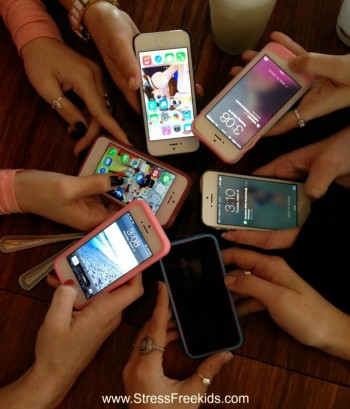by Cindy Springsteen
As a parent of two teens, cell phone use is a hot topic. Growing up in the type of world that we live in now, I cannot imagine how my parents ever survived without keeping in touch with me.  I had the freedom to leave the house and return many hours later, during which time my parents had no idea where I was or who I was with.
I had the freedom to leave the house and return many hours later, during which time my parents had no idea where I was or who I was with.
Both of my children have cell phones. They were originally gotten so that I knew where they were and who they were with. As time has gone on this has turned into something much more. Cell phones now mostly smart phones open up a whole world of technology for teens and adults as well. In a split second they can be on social media sites or any web site that they want to be on. Teens and some adults as well are addicted or in some ways I feel obsessed with this technology, causing a lack in some of the social skills that we as adults at least had grown up with.
According to a national survey from CTIA and Harris Interactive nearly half (47%) of US teens say their social life would end or be worsened without their cell phone, and nearly six in 10 (57%) credit their mobile device with improving their life. Also four out of five teens (17 million) carry a wireless device.
The study also confirmed that texting is replacing talking among teens. Teens admitted spending nearly an equal amount of time talking as they do texting each month. The feature is so important to them that if texting were no longer an option 47% of teens say their social life would end or be worsened.
There seems to be a lack of communication in today’s world as a result of cell phones, which these studies are confirming. Teens spend more time texting others rather than have to speak to a person or have a face to face conversation. This addiction has also opened up a whole new way for children to bully others easier by sending anonymous messages through technology.
Like some addictions such as drinking, smoking and drugs, cell phones have been added to this list. This can become quite scary as a parent. You want to be able to keep in touch with your child when they are not home, yet there is fear for the future of having a world filled with people who cannot properly communicate.
What will happen when these children are put into the work force? When their boss asks them a question, what will the response be “wait let me get to my office and I will text you what I think?” My children have sent me a text message from the next room, while I am within hearing distance! Setting limits and being able to adhere to them I believe is the only compromise with cell phones. As you walk around today, wherever you seem to go, there is not a teen walking without a phone attached to their ear or fingers busy moving sending a text message.
Now, to be fair many adults, including myself at times, are using cell phones too. We live in a world filled with an addiction to cell phones, but where will this lead? What with our world be like in 10 years when these addicted teens are grown up? Can anything even be done at this point in time when the addiction has grown to the levels it has. Every month new phones come out with even more advances in technology.
Many homes have even done away with “land line phones” adopting just cell phones as a means of communication. According to a study by the National Center for Health Statistics, about 15 percent of households were cell phone only (i.e. had no landline) in 2007.
Did you know that according to The Mobile Youth Report:
- 81% of youth under 25 sleep with their phone next to them on the bed.
- 74% reach for their smartphones immediately after waking up.
- 97% of teens & 91% of 20 year olds regularly use smartphones in the bathroom to check messages.
The trend in distracted driving (i.e. texting and driving) shows the cultural motivation to connect even if it means putting their lives at risk:
- 95% teens text while driving when alone compared to 32% who text when a friend is in the car.
What will communication be like in the future? The schools today use computers and Ipads, leading to less hand writing and even books are read online. Do these methods really help learning or are they really hurting the future of our world even more? How many lives will be lost due to this new technology and using it at inappropriate times? Is it too late, or can something be done to help fix this?
Cindy Springsteen is a published poetry writer, whose first children’s book “Waffles and Pancakes A Lesson in Friendship” was released in April 2012. In September 2012 book two “Waffles and Pancakes A Lesson in Bullying was released. Each book has a moral which help to teach valuable lessons with cute loveable characters. She has been writing since she was in her teens. You can find her on twitter at https://twitter.com/C_Springsteen. She spent many years researching and writing about parenting teenagers for various publications, along with her own website www.cindy-springsteen.com.You can also follow her on facebook at https://www.facebook.com/author.cindy.springsteen